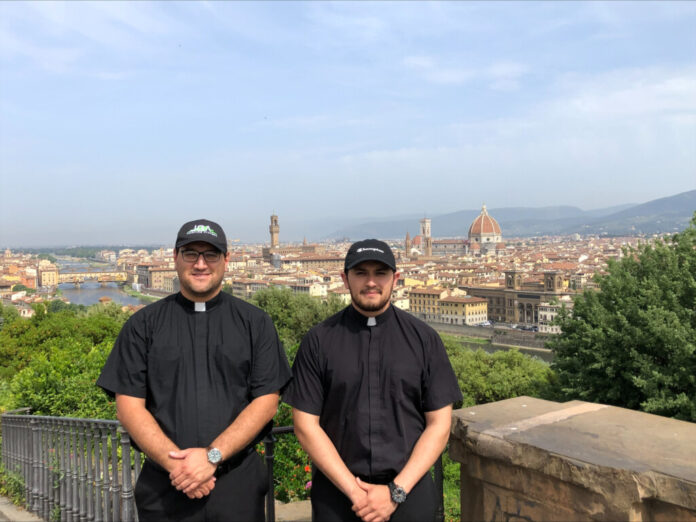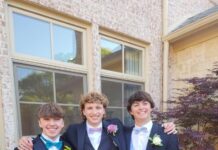On Saturday May 20th, Bishop Edward Burns ordained eight men. Three of these ordained men are Jesuit graduates: Fr. Kevin Kolker ’11 , Fr. Cesar Garcia ’14, and Fr. Miguel Sotelo ’14. On September 11, Associate Editor Sebastian Suwanda ’26, and I interviewed Father Miguel Sotelo. We were able to learn more about Father Sotelo’s priestly formation and his time at Jesuit which helped him become more inspired to be a priest.
Interview
What compelling point in your life brought you to the decision to become a Priest?
One day I just was experiencing God’s love in a very unique and profound way and from there I wanted to respond to that love of God. Another experience was the sacrament of confession, to experience forgiveness and absolution and to also be an instrument for the sacrament for other people was important. Those are two key moments throughout my experience here at Jesuit Dallas. Also just meeting with the Jesuit priests here was a treasure; Father Hewitt and Father Anthony Wick were good spiritual guides for me and taught me who Jesus is. Not just facts about Jesus but who Jesus is.”
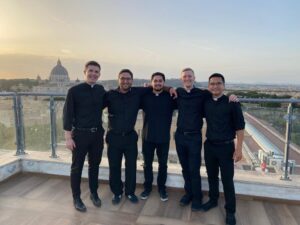
Were there any moments while at Jesuit that furthered your faith life?
“I would say the mission trips we experienced. Having the privilege of going to Nicaragua for three summers in a row under the guidance of Mr. Rich Perry and Mr. Keith Reese was important. Both were very good figures and guides in my life and very instrumental for my discernment for the vocation.”
How has the transition from seminary/deacon life to a newly ordained diocesan priest been?
“It’s wonderful. I’ve been looking forward to this moment since seminary. I’m glad I’m in a parish now and with the parishioners. I’m just happy to be with the people, to be serving the parishioners and be involved in families’ lives. That’s really what I’ve been looking forward to a lot and is what I’m enjoying a lot.”
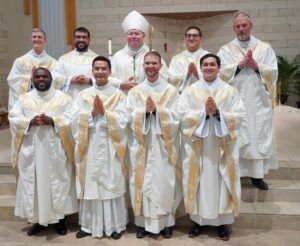
Did you ever consider becoming a Jesuit priest?
“I did, but when I saw the amount of studies that they do, I said “No.” I went on a silent retreat with Father Anthony Wick and at that time he provided a space and time for me to really silence myself and listen to my desires and come to find out truly what I was desiring. Even though I’m a diocesan priest, Jesuit really formed me to be a man for others and to be a man with others. That’s what I’ve been seeing in my priesthood, so far, at Saint Mark’s.”
What were some key spiritual moments for you during your seminary life and process to become a priest?
“I would say more than anything the experiences of doing mission work. Going to another country and entering people’s lives and recognizing that they’re part of the human family and we’re all part of one human family is important. Also, to be able to respond in that way through the vocation to the priesthood is important. Because we don’t marry woman, we become celibate responding and being available for the people. As one cardinal put it, “we don’t marry and we’re not exclusive for any one person, so that we can be available for all people.” Recognizing that we desire to serve the people and to serve God really demonstrates how we receive God’s love in our life. In that way, it just becomes a part of who you are and becomes a natural lifestyle. It becomes a calling and you want to respond to that deep desire to be available to love the people. In seminary we had mission experiences, my senior year at Saint Bens to Guatemala, and then throughout theology at Notre Dame seminary we had many mission trips to different places like Porto Rico, to Juarez Mexico, and then we stayed local because of the Hurricanes that devastated the state of Louisiana. Being able to apply the study of theology in acts of love and service to the people were the key moments for me because those were moments of integration that makes sense, not only just receiving more information but actually undergoing a transformation with these experiences.”
Going to another country and entering people’s lives and recognizing that they’re part of the human family and we’re all part of one human family is important. – Fr. Soleto
Did you always want to become a priest or was it a process over time?
“I think kind of both if that makes sense. Since I was very young I felt attracted to the priesthood for some reason and then it was my sophomore year here at Jesuit where I put it off and I dated one girl. But I was desiring something deeper and I think that was maybe a key moment for me. It was gradual at different moments in my life where there were affirmations to continue and pursue priesthood.”
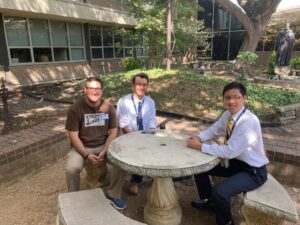
Why do you think diocesan priesthood spoke to you?
“What I love about diocesan priesthood is that you are assigned to a parish where that parish then becomes your family. I’ve always been drawn to that kind of ministry where you get to know and walk with your parishioners, and know them at a deeper level. Being able to go over to their homes and actually dine with them, and get to know their life stories, and to love them in that way to serve them is important.”
How would you sum up a daily life as a priest?
“A day in the life of a priest really just depends. So far it’s been consistent of meetings with the parish employees at the office, a lot of pastoral counseling one-on-one with parishioners who are coming over with burdens and different needs. I have the blessing to be assigned to Saint Marks where it offers confession four times a week, which of course keeps us busy, and we have mass three times a day throughout the week as well as 8 masses on the weekends. I have a lot of Sacramento ministry in that aspect but also we’re in charge of Medical City Plano, so whenever we’re on call, we have to be attentive to calls there to anytime of the day or night to go anoint our parishioners or other people that request to be anointed. It’s been a great joy to work as a priest.”
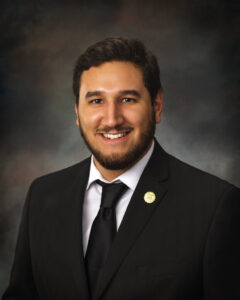
Out of the six profiles of the Jesuit graduate, which one is most important to you?
“It’s kind of hard to say just one, but if it were to be one it would be loving. In the study of theology you’re getting to know more about God and about the church but really to continue to know God on a personal level who loves you with no conditions, with no measure, with no regrets and to let that be your motivation your love for the people as well has been important.”
Father Sotelo wanted to add additional information about priesthood:
“Also being invested in my hobbies to find a balance in a busy day has been important. I’ve gotten into tennis a lot more which I’m very happy about because it’s good for me but also it’s so much fun. For example, Mondays are my days off so I get to spend the time with family. Today I was able to golf with my dad, and again I’m not a good golfer but it was good to be out there with him and spend some quality time with family and friends as well.”
Stay tuned to The Roundup for more Community and Religious news


